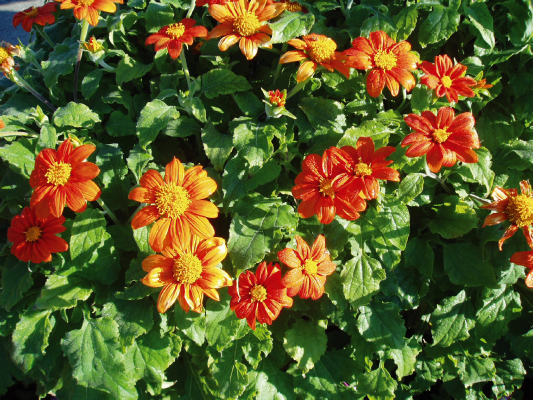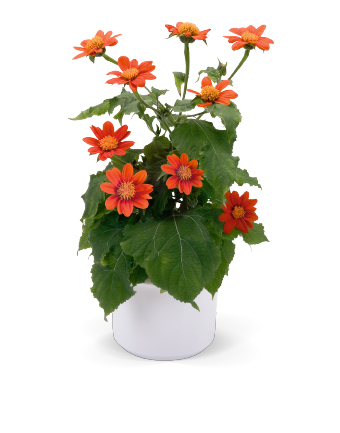

Fiesta del Sol
Ideal for Containers and Borders
- Mid-sized growth
- Ideal for containers, borders and landscape plantings
- Heat tolerant
- Attractive summer bloomer
- Crop Time
- Spring: 12 - 15 weeks
- Height ∅
- 30 ″ / 75 cm
- Exposure
- Sun - Partial shade
- Seed Form
- Raw Seed
- Best Uses
- Bedding, Landscape, Pot Plant
Culture guide
Usage
Plant for bedding, summer pot and container plants, attractive for bees
Sow time
February-May
Sowing method
1-3 seeds per plug
Germination
5-8 days at 64-72 °F (18-22 °C), light is required for germination
Growing on
Grow on at 53-59 °F (12-15 °C). Tithonia does not tolerate temperatures below 49 °F (10 °C).
Media
Use a well-drained, growing substrate with 20-30 % clay, 1-1,5 kg/m³ of a complete balanced fertilizer, iron-chelate, micronutrients, pH: 5.8-6.5.
Temperature
Grow at 12-15 °C. Tithonia does not tolerate temperatures below 10 °C, even for short time and this can cause for red-brown or yellow leaves. Tithonia does tolerate high temperatures.
Fertilization
Low-moderate fertilization levels are required. Fertilize the crop weekly with 100-150 ppm nitrogen, using a complete balanced fertilizer. Avoid high ammonium and high nitrogen levels.
Stage I Starts with the radicle breaking through the testa. The roots are touching the medium. Ends with fully developed cotyledons.
Stage II Starts from fully developed cotyledons. Ends with the fully developed true leaf or true leaf pair.
Stage III Starts from the fully developed true leaf or true leaf pair and ends with 80% of the young plants being marketable.
Stage IV All young plants are ready for sale and in the process of being hardened off. This stage lasts about 7 days.
The cultural recommendations are based on results from trials conducted under Central European conditions. Different conditions in other parts of the world may lead to deviations in results achieved.
